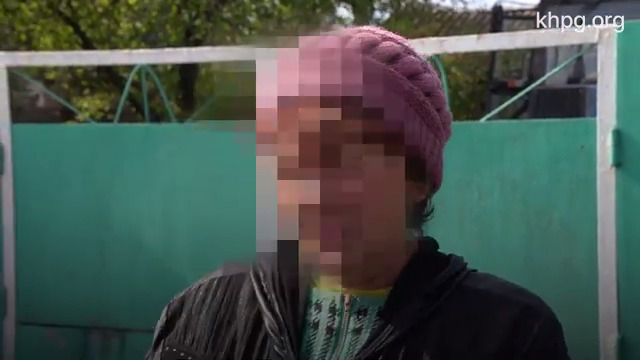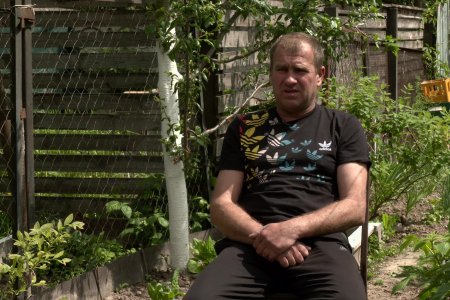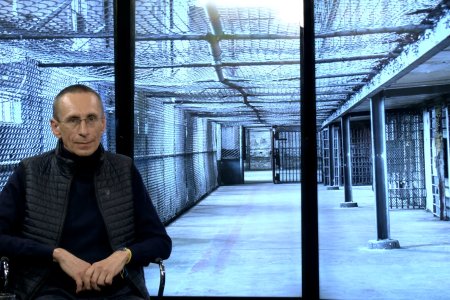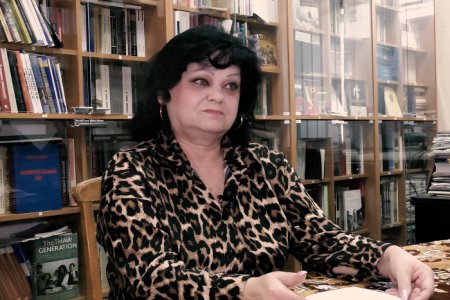The village of Hroza in the Kharkiv Region found itself under Russian occupation in the first weeks of the full-scale Russian invasion. In March 2022, Russian troops entered the village of Shevchenkovo and the surrounding settlements, including the village of Hroza. From the very first days of the occupation, the Russian military began traditional tactics of terror against the local population: arbitrary searches, robberies, abductions, and torture of the local population. Those at risk included former military personnel, ATO [Anti-Terrorist Operation] participants, residents with expressed pro-Ukrainian views, and sometimes random victims.
The occupiers recruited collaborators to create lists of “unreliable” residents and intimidate the population. In Hroza, they were lucky: in the first days, a whole family named Mamon, among whom were two former law enforcement officers, agreed to cooperate with the invaders.
Residents say that Mamon’s father, Serhii Mamon, took control and gave orders to his sons. Volodymyr and Dmytro Mamon were directly involved in intimidating the local population and determining who was sent to the basement. The third brother, Oleksandr, also helped them.
On 11 October, the Security Service of Ukraine reported that it was the brothers Volodymyr and Dmytro Mamon who were involved in a missile attack on a cafe in the village of Hroza, where a funeral was held. As a result of the strike, 59 residents were killed. The Kharkiv Region prosecutor’s office reports that all the dead were civilians. There was a child among the dead.
Larysa Shevchenko (name and surname have been changed for security reasons; KHPG knows the woman’s valid details) spoke about the crimes of the Mamon family even before it became known about their involvement in the missile attack on the village. Her son was grabbed from his home and taken in an unknown direction. Larisa searched for her son for several days and found him in one of the occupiers’ torture centers in Kupiansk.

“I went to Shevchenkovo but found nothing there, so I started going to Kupiansk. It was hot, and my legs were bleeding; I walked through Russian checkpoints. The husband said: “They will kill you there.” I replied: “They won’t kill me. Let them kill me. These are fascists.“ I had to walk because nothing was running. I was looking for [my son], and they didn’t tell me he was there. They kept people in basements: not only in the police station, there were many more basements in Kupiansk.
According to Larisa, she saw several times how captured Ukrainians were led through the streets of Kupiansk in a bent position, with their hands and eyes tied. Those who fell to the ground were kicked and beaten with machine gun butts. In the torture chambers, prisoners were beaten, given electric shocks through their bodies, and kept suspended in chains. These data are confirmed by the prosecutor’s office of the Kharkiv Region, which has been investigating crimes of Russians in the occupied territories since the de-occupation.
“The police bullied us. One guy was there, and another was at the military registration and enlistment office. There is old agricultural equipment, where the guys were held on sticks. Behind the police station, there is no roof, only bars: the guys were kept on those bars, on chains, for months, with a bucket instead of a toilet. They were kept in these cages standing. While one is standing, the other can crawl under the bed. They were not allowed to eat. They were tortured and shocked with electric current. I saw them being led into the car, and no one could raise their head — bent down, hands behind their backs. I couldn’t look. Russians were walking with machine guns from both sides. They tortured ours so much. They say that our people do not torture Russians. They tormented us. They are such scoundrels,” — recalls Larysa.
Her son managed to escape from captivity thanks to the rapid counter-offensive of the Ukrainian Armed Forces in the fall of 2022 when, in a few days, Balakliia, Shevchenkove, Izium, and almost the entire Kharkiv Region were liberated. The Russians at that time used prisoners for forced labor to remove rubble in the city. At the time of the counter-offensive of the Ukrainian Armed Forces, the occupiers ran away so quickly that they lost control over some of the prisoners. So Larisa’s son ended up at home the day before the de-occupation of Kupiansk.
On 6 October, a day after the missile strike on Hroza, Larysa recalled the name of Mamons as the principal collaborators in the village. Their family fled with the occupiers and is hiding in Russian-controlled territories. It is known that at least Volodymyr and Dmytro Mamon received Russian passports. According to the SBU, they used their informants among the local population of Hroza and other settlements in the Kharkiv Region to direct Russian attacks.



